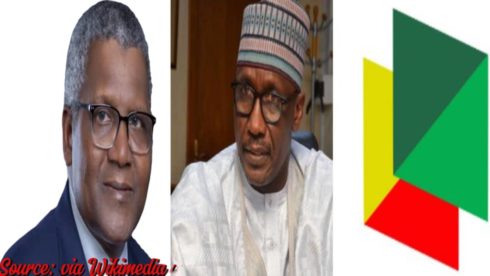The Nigerian National Petroleum Company Limited (NNPCL) has clarified its position in the country’s deregulated petroleum market, specifically regarding its relationship with the Dangote Refinery. In a recent statement, NNPCL emphasized that the Dangote Refinery and other domestic refineries are free to sell their products directly to marketers under a “willing buyer, willing seller” framework. This announcement comes amidst growing speculation about NNPCL potential role as a distributor for the Dangote Refinery, particularly in light of the refinery’s impending commencement of operations.
The Nigerian National Petroleum Company, however, has decisively put the ball in Dangote’s court, distancing itself from any involvement as a sole offtaker for the refinery’s products. In the statement, NNPCL reiterated its commitment to a competitive, free market environment where refineries can thrive independently, signaling a shift away from centralized control towards market-driven dynamics.
Deregulation and the ‘Willing Buyer, Willing Seller’ Framework
In the wake of Nigeria’s full deregulation of its downstream petroleum sector, the NNPCL’s latest declaration reinforces the principles underpinning this policy shift. Under the “willing buyer, willing seller” arrangement, refineries such as Dangote are granted the autonomy to negotiate sales directly with marketers, allowing for greater market competition and price discovery. This contrasts with the previous regime where NNPCL played a more dominant role in regulating fuel distribution.
The implication of this framework is that domestic refineries, like Dangote, are empowered to set prices based on market demand and supply dynamics. This, according to experts, will drive innovation and efficiency in the sector as refineries compete to offer better prices and services to marketers and consumers alike.
No Sole Offtaker Arrangement: NNPC Rejects Centralized Distribution
Contrary to speculation, NNPCL has rejected the notion that it would serve as the sole offtaker for the Dangote Refinery’s products. “NNPCL has no intention or desire to act as a distributor for any entity in a free market environment,” the corporation stated. This marks a clear departure from the past, where NNPCL had considerable influence over petroleum product distribution in Nigeria.
By stepping back from the role of a centralized distributor, NNPCL is signaling its confidence in the ability of the market to self-regulate. This decision also sets the stage for other domestic refineries to operate freely, leveling the playing field for all participants in the petroleum industry.
Dangote Refinery’s Opportunity in a Deregulated Market
With NNPCL announcement, the Dangote Refinery now has a unique opportunity to capitalize on the deregulated market environment. The refinery, which is set to be the largest in Africa, can leverage its production capacity to offer competitive prices to marketers, especially in a market where petrol prices have been perceived as high. This flexibility to sell directly to marketers at lower prices could position Dangote Refinery as a dominant player in Nigeria’s petroleum sector.
Industry analysts believe that Dangote’s ability to adjust its prices based on market forces could lead to significant benefits for consumers. By offering lower prices, the refinery could gain market share while also playing a pivotal role in stabilizing Nigeria’s fuel supply.
Impact of Recent PMS Price Changes on Domestic Refineries
NNPCL statement also addressed concerns about how recent changes in Premium Motor Spirit (PMS) prices might affect domestic refineries. The corporation clarified that the fluctuations in PMS prices do not impact refineries’ access to the Nigerian market. Rather, these price changes present an opportunity for refineries like Dangote to offer competitive pricing.
This development highlights the dynamic nature of Nigeria’s petroleum market post-deregulation. Refineries now have the ability to respond quickly to market conditions, adjusting their production and pricing strategies accordingly. This will likely lead to more price variation at the pump, benefiting consumers as competition intensifies.
NNPC’s Vision for a Competitive Petroleum Market
Ultimately, NNPCL announcement aligns with its broader vision of fostering a competitive and transparent petroleum market in Nigeria. By allowing refineries to operate freely under the “willing buyer, willing seller” model, the corporation aims to reduce the government’s direct involvement in the sector, encouraging private investment and innovation.
This shift toward deregulation is expected to create a more resilient and efficient petroleum market in Nigeria. As NNPCL steps back from its traditional role as a central distributor, refineries like Dangote are now poised to lead the charge in transforming the landscape of fuel supply and pricing in the country.
Table of Contents
Discover more from OGM News NG
Subscribe to get the latest posts sent to your email.














